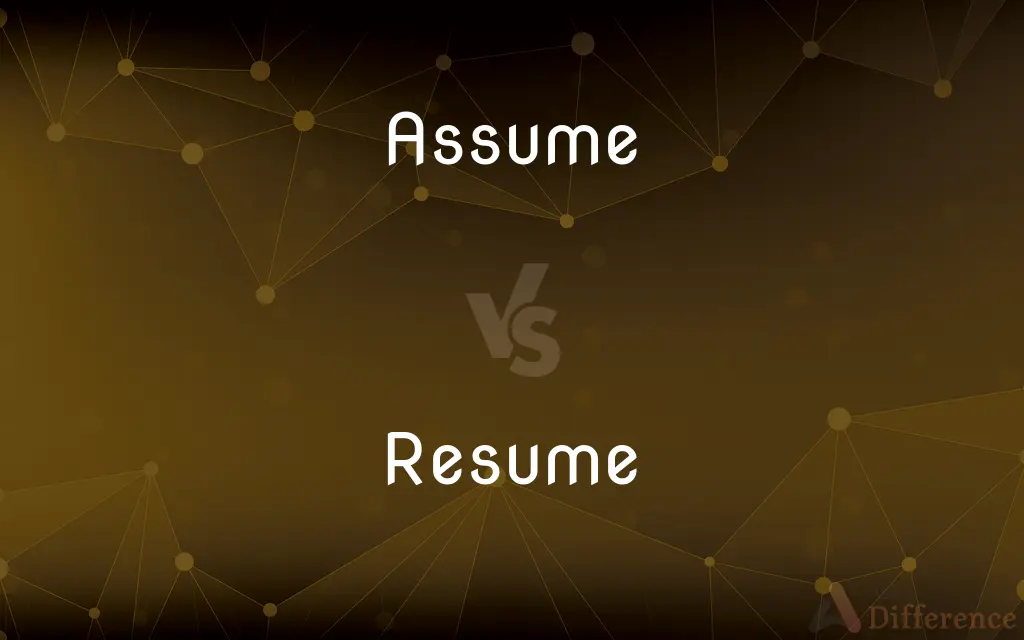Assume vs. Resume — What's the Difference?
By Tayyaba Rehman & Fiza Rafique — Updated on March 11, 2024
Assume means to accept something as true without proof, while resume means to begin again after a pause or interruption.

Difference Between Assume and Resume
Table of Contents
ADVERTISEMENT
Key Differences
Assume involves taking something for granted or adopting a particular stance based on belief rather than evidence. On the other hand, resume indicates the action of restarting something that was previously paused, halted, or interrupted, such as a job, activity, or process.
When you assume, you make an inference or adopt an idea without needing concrete proof, often leading to a belief or action based on unverified information. Whereas, to resume something is a clear, deliberate action that follows a break, pause, or disruption, signifying a continuation of what was temporarily stopped.
Assuming can have a wide range of applications, from forming opinions about situations or individuals to accepting roles or responsibilities without full knowledge. Conversely, resuming often relates to tangible activities or processes, such as work, meetings, or other engagements that can be paused and then actively restarted.
The act of assuming can affect decision-making and perceptions, potentially leading to misunderstandings or incorrect conclusions if the assumptions are unfounded. In contrast, resuming is a practical step that affects the flow of activities, emphasizing a return to normalcy or continuation of progress.
While assuming is an internal cognitive process that might not immediately translate into external action, resuming is an external, observable action that demonstrates a return to or continuation of a specific state or activity, highlighting the differences between mental assumptions and physical actions.
ADVERTISEMENT
Comparison Chart
Definition
Accept something as true without proof
Begin again after a pause or interruption
Nature
Cognitive, based on belief
Action-oriented, based on continuation
Application
Beliefs, opinions, acceptance of roles
Activities, jobs, processes
Outcome
Can lead to misconceptions if incorrect
Leads to continuation of previous activities
Visibility
Internal process, not directly observable
External action, observable
Compare with Definitions
Assume
Accept as true without proof.
He assumed the noise was just the wind, without investigating further.
Resume
Restart something after a pause.
The players resumed the game after the rain stopped.
Assume
Make an initial estimate or hypothesis.
The scientist assumed a direct correlation between the variables before conducting the experiment.
Resume
Begin to flow or operate again.
The factory resumed production immediately after the maintenance break.
Assume
Begin to have a particular quality or character.
The discussion assumed a more serious tone as the topic shifted.
Resume
Continue with an activity or process.
He resumed his studies after taking a year off to travel.
Assume
Take on a role or responsibility.
She assumed the role of project manager in the absence of her supervisor.
Resume
Return to a previous state or position.
After her leave, she resumed her duties as if she never left.
Assume
Adopt a certain expression or demeanor.
He assumed an air of confidence as he walked into the interview.
Resume
Reoccupy a place or position.
The audience resumed their seats after the intermission.
Assume
To take for granted; suppose
The study assumes that prices will rise.
Resume
Begin again or continue after a pause or interruption
A day later normal service was resumed
The talks resumed in April
Assume
To take upon oneself (a duty or obligation)
Assume responsibility.
Assume another's debts.
Resume
A summary
I gave him a quick résumé of events
Assume
To undertake the duties of (an office)
Assumed the presidency.
Resume
Another term for curriculum vitae
Assume
To take on (an appearance, role, or form, for example); adopt
"The god assumes a human form" (John Ruskin).
Resume
A brief account of one's professional or work experience and qualifications, often submitted with an employment application.
Assume
To pretend to have; feign
Assume an air of authority.
Resume
A summary
A résumé of the facts of the case.
Assume
To take over without justification; seize
Assume control.
Resume
To begin or take up again after interruption
Resumed our dinner.
Assume
To clothe oneself in; don
The queen assumed a velvet robe.
Resume
To assume, take, or occupy again
The dog resumed its post by the door.
Assume
To take up or receive into heaven.
Resume
To take on or take back again
Resumed my original name.
Assume
To make a supposition; suppose or believe
"Is Kay's husband coming to dinner too?" "I assume so.".
Resume
To begin again or continue after interruption.
Assume
To authenticate by means of belief; to surmise; to suppose to be true, especially without proof
We assume that, as her parents were dentists, she knows quite a bit about dentistry.
Resume
To take back possession of (something).
Assume
To take on a position, duty or form
Mr. Jones will assume the position of a lifeguard until a proper replacement is found.
Resume
To summarise.
Assume
To adopt a feigned quality or manner; to claim without right; to arrogate
He assumed an air of indifference
Resume
(transitive) To start (something) again that has been stopped or paused from the point at which it was stopped or paused; continue, carry on.
We will resume this discussion tomorrow at nine.
Assume
To receive, adopt (a person)
Resume
(intransitive) To start again after an interruption or pause.
Normal service has resumed.
Assume
To adopt (an idea or cause)
Resume
A summary or synopsis.
Assume
To take to or upon one's self; to take formally and demonstratively; sometimes, to appropriate or take unjustly.
Trembling they stand while Jove assumes the throne.
The god assumed his native form again.
Resume
A summary or account of education and employment experiences and qualifications; a curriculum vitae (often for presentation to a potential future employer when applying for a job).
Assume
To take for granted, or without proof; to suppose as a fact; to suppose or take arbitrarily or tentatively.
The consequences of assumed principles.
Resume
A summing up; a condensed statement; an abridgment or brief recapitulation.
The exellent little résumé thereof in Dr. Landsborough's book.
Assume
To pretend to possess; to take in appearance.
Ambition assuming the mask of religion.
Assume a virtue, if you have it not.
Resume
To take back.
The sun, like this, from which our sight we have,Gazed on too long, resumes the light he gave.
Perhaps God will resume the blessing he has bestowed ere he attains the age of manhood.
Assume
To receive or adopt.
The sixth was a young knight of lesser renown and lower rank, assumed into that honorable company.
Resume
To enter upon, or take up again.
Reason resumed her place, and Passion fled.
Assume
To be arrogant or pretentious; to claim more than is due.
Resume
To begin again; to recommence, as something which has been interrupted; as, to resume an argument or discourse.
Assume
To undertake, as by a promise.
Resume
Short descriptive summary (of events)
Assume
Take to be the case or to be true; accept without verification or proof;
I assume his train was late
Resume
A summary of your academic and work history
Assume
Take on titles, offices, duties, responsibilities;
When will the new President assume office?
Resume
Take up or begin anew;
We resumed the negotiations
Assume
Take on a certain form, attribute, or aspect;
His voice took on a sad tone
The story took a new turn
He adopted an air of superiority
She assumed strange manners
The gods assume human or animal form in these fables
Resume
Return to a previous location or condition;
The painting resumed its old condition when we restored it
Assume
Take on as one's own the expenses or debts of another person;
I'll accept the charges
She agreed to bear the responsibility
Resume
Assume anew;
Resume a title
Resume an office
Resume one's duties
Assume
Occupy or take on;
He assumes the lotus position
She took her seat on the stage
We took our seats in the orchestra
She took up her position behind the tree
Strike a pose
Resume
Give a summary (of);
He summed up his results
I will now summarize
Assume
Seize and take control without authority and possibly with force; take as one's right or possession;
He assumed to himself the right to fill all positions in the town
He usurped my rights
She seized control of the throne after her husband died
Assume
Make a pretence of;
She assumed indifference, even though she was seething with anger
He feigned sleep
Assume
Christianity, obsolete; take up someone's soul into heaven;
This is the day when May was assumed into heaven
Assume
Put clothing on one's body;
What should I wear today?
He put on his best suit for the wedding
The princess donned a long blue dress
The queen assumed the stately robes
He got into his jeans
Common Curiosities
Why is it important to resume activities after a break?
Resuming activities after a break is important to continue progress, maintain routines, or complete tasks that were previously halted.
Can "assume" and "resume" be used interchangeably?
No, "assume" and "resume" have distinct meanings and cannot be used interchangeably.
How does assuming affect decision-making?
Assuming can affect decision-making by leading to choices based on unverified information, potentially causing errors or misunderstandings.
What does it mean to assume something?
To assume something means to accept it as true without requiring evidence or proof.
What does it mean to resume something?
To resume something means to start it again after it has been paused or interrupted.
What kinds of activities can be resumed?
Activities that can be resumed include work, studies, projects, meetings, and any other processes that were temporarily stopped.
What is necessary to resume a paused activity?
To resume a paused activity, it is necessary to have the intention and take action to continue or restart the process.
Can assumptions be positive?
Yes, assumptions can be positive when they lead to constructive actions or optimistic outlooks, but they still require caution.
Is assuming always a negative action?
No, assuming is not always negative, but it can lead to misunderstandings or incorrect decisions if based on false premises.
Does resuming require previous experience?
Resuming an activity typically requires some level of previous experience or familiarity with what is being continued.
What triggers the need to resume something?
The need to resume something is triggered by the end of a pause, break, or interruption, requiring a return to a previous activity.
Can you assume responsibility for something?
Yes, you can assume responsibility for something, meaning you take on duties or obligations without being explicitly assigned to them.
How does one communicate they are resuming something?
Resuming something can be communicated through verbal announcement, written notice, or simply by the action of continuing the activity.
Can both "assume" and "resume" have implications in the workplace?
Yes, both can have implications in the workplace: assuming can affect decision-making and perceptions, while resuming impacts workflow and productivity.
How can one avoid the pitfalls of assuming?
To avoid the pitfalls of assuming, one should seek evidence, verify information, and keep an open mind before forming conclusions.
Share Your Discovery

Previous Comparison
Solitary vs. Solitude
Next Comparison
Negligent vs. NegligibleAuthor Spotlight
Written by
Tayyaba RehmanTayyaba Rehman is a distinguished writer, currently serving as a primary contributor to askdifference.com. As a researcher in semantics and etymology, Tayyaba's passion for the complexity of languages and their distinctions has found a perfect home on the platform. Tayyaba delves into the intricacies of language, distinguishing between commonly confused words and phrases, thereby providing clarity for readers worldwide.
Co-written by
Fiza RafiqueFiza Rafique is a skilled content writer at AskDifference.com, where she meticulously refines and enhances written pieces. Drawing from her vast editorial expertise, Fiza ensures clarity, accuracy, and precision in every article. Passionate about language, she continually seeks to elevate the quality of content for readers worldwide.













































